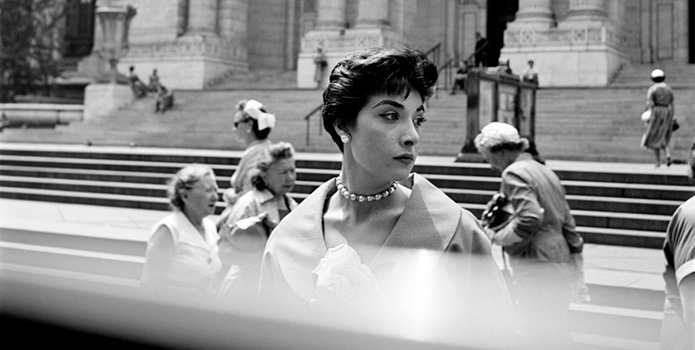Title: Finding Vivian Maier
IFC Films
Reviewed for Shockya by Harvey Karten. Data-based on Rotten Tomatoes
Grade: B+
Director: John Maloof, Charlie Siskel
Screenplay: John Maloof, Charlie Siskel
Cast: John Maloof, Joel Meyerowitz, Mary Ellen Mark, Phil Donahue, Duffy Levant, Joe Mathews, Michael Strauss, Howard Greenberg
Screened at: Review 1, NYC, 3/14/14
Opens: March 28, 2014
Ninety percent of Americans have access to smart phones, many of which can take pictures. If you look at the snapshots on Facebook, you’ll realize that these photos were hardly meant to be exhibited in galleries but are posted for friends and family. Not true of Vivian Maier, the subject of John Maloof and Charlie Siskel’s informative documentary. Vivian Maier is yet another artist who became famous only after her death, but if you follow Maloof and Siskel’s interview subjects, you’ll realize that fame and even fortune were the last things that the subject would have wanted.
Of course a good deal of the documentary shows some of her famous pictures, including one of a young black man on horseback in a city street and a homeless man who looks like the hoboes that lined the railroad tracks during the Great Depression. Connoisseurs will point out how these photos are works of art, though to a philistine like me they look like something that anyone not wholly centered on snapping friends and family could take.
For me, more important than the evidence that Maier had a way with photographing children and those in less desirable neighborhoods, is the story of her life itself. Born in New York in 1926, she made her way to Chicago where she worked as a nanny, including a brief stint in the home of talk-show host Phil Donahue (who is among the interviewed subjects). She took her young charges with her on her shoots, including one trip to the Chicago stockyards, but—and this is the central feature of the movie—she did not show any of her one hundred thousand photos to anyone. The pictures were discovered by chance when director Maloof, a 29-year-old local Chicago historian, bought an unknown box at a cheap auction for about three hundred dollars. Amazed at the artistry of the pictures inside, he bought up similar boxes from others, contacted MOMA for a potential exhibit, was turned down, but persevered and lucked out. Maier had exhibits of her work in the U.S., Britain, Germany, Denmark, Norway, Belgium and France. Her photos can be seen in the book Vivian Maier: Street Photographer.
Maier was born in New York but her childhood was spent in France with her Austrian father (who bolted from the family) and her French mother. She moved to New York ag the age of 25, worked in a sweatshop, got to Chicago’s North Shore in 1956 and worked on and off as a nanny. Spending fourteen years with one family, she used a simple Rolleidex camera to snap pictures all over the city. That she was able to look down into the camera’s viewfinder instead of aiming at eye level allowed her to take the shots without attracting too much attention.
The documentary is almost as much about Maloof, who made Maier famous, as it is about the subject. The documentarian points out that her small rooms were stuffed with newspapers from the floor to the ceiling, including hundreds of receipts and other papers showing Maier to be a pack rat. The same charge could be made of Maloof, at least to a small extent, as he pored over the photos and papers he came across, organized them, and promoted them in galleries. Though Maier was provided for by children of one family she cared for—given a house in Chicago and paying her rent—she had been homeless for a while, though Maloof found scores of uncashed Social Security checks in her rooms.
The pacing is brisk, collages of photos well represented, and interviews penetrating; all agreeing that Maier was eccentric. They note that she would not give out her real name, calling herself V. Smith and other variations, clearly a person who was wrapped up in herself, yet ironically projecting herself out to the world in the thousands of photos she hoarded.
Unrated. 83 minutes. © 2014 by Harvey Karten, Member, New York Film Critics Online
Story – A-
Acting – B
Technical – B+
Overall – B+

